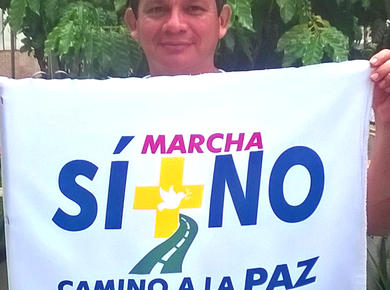Posted: February 14, 2017
A plebiscite was held in Colombia on 2 October 2016, for the citizens to approve or reject the agreements reached between the government and the Fuerzas Armadas Revolucionarias de Colombia – Ejercito del Pueblo (Revolutionary Armed Forces of Colombia – People’s Army, FARC) after four years of negotiations. A variety of groups participated in this process: citizens’ groups, international advisers and, most notably, victims of the armed conflict. The agreements cover six areas:
(1) Holistic rural reform – promoting agricultural development, access to land and poverty reduction;
(2) political participation, including non-violent conflict management, setting aside the use of weapons as a political strategy, and promoting reconciliation;
(3) an end to the armed conflict: disarmament by the FARC and reintegration into civilian life;
(4) guaranteeing the human rights of victims, including truth-telling, transitional justice that fosters coexistence, reconciliation and guarantees of non-repetition;
(5) solving the problem of illicit drugs; and (6) mechanisms for oversight and ensuring citizen-endorsement and implementation of the agreements.
The transformative power of the process was evident in the bilateral ceasefire and the FARC’s commitment to meet their objectives through dialogue as opposed to arms. It was also seen in scenes such as the one in the photo. In it, Ivan Márquez, chief negotiator for the FARC, apologizes to victims and then is hugged by one of them in an emotional act of reconciliation.1 When asked to describe Márquez in one word, the government´s High Commissioner for Peace said simply “transformed.”
Even so, when the accord was put to a vote in the plebiscite, 62% of the population abstained, and of those who voted, 50.23% voted “no” and 49.76% voted “yes.” It did not pass. In those regions of the country that have been most affected, the majority voted “yes.” In the regions less affected by the war, the tendency was to vote “no.”
At the time of the vote, everyone stated that they wanted peace; however, those who opposed the agreements would say, “Peace, but not on those terms.” The accord was intensely debated in all quarters, including the churches, and certainly among the Anabaptist churches belonging to Mennonite World Conference (MWC). Given the strong campaign to reject the accord put forward by some leaders of the largest evangelical churches, and given the close outcome of the vote, it is difficult to ignore the crucial impact of the evangelical churches on the result of the plebiscite.
Those who voted “yes” saw the agreements as a means to achieve disarmament in favor of nonviolent political action, peacebuilding efforts that are free from stigma or threat, restorative justice, priority to the victims, and proposals that address structural socioeconomic realities in a way that can bring about wellbeing for the country and the most vulnerable parts of its population.
Amongst those who voted “no,” the concerns were that transitional justice is equivalent to impunity, the participation of insurgent leaders in politics is unacceptable, the demobilized guerillas will receive too many benefits, rural reform will negatively affect the economy, and that the preferential treatment for women and for those who identify as LGBTQ (both of whom were seen as having been particularly victimized) introduces a gender ideology and constitutes an attack on the family. This last issue was of great concern for many in the churches.
It is also important to note that distortions were allegedly used as campaign propaganda, such as admitted by the chairperson of the ‘no’ campaign of one of the opposition movements.
As churches, we are faced with the question of how it is possible that we could have come to such different conclusions (yes or no) based on the same Bible and professing the same lordship of Christ? It is also an opportunity to grow in our capacity to approach critical topics in such a way as to strengthen unity – rather than polarization – in light of 1 Corinthians 12:7 which affirms, “to each is given the manifestation of the Spirit for the common good.”
As Anabaptist churches in Colombia, and members of MWC, God has given us the grace to grow in our capacity to worship God and work together without denying our differences. This includes joint worship services and working together on peace education, on conscientious objection, with victims, with children and with vulnerable populations. In this collaboration of our churches and institutions, it is important to recognize the significant support of the Mennonite Central Committee and MWC in opening spaces to come together. Certainly, we will all continue to pray for peace and join our efforts, each contributing according to the light that has been given them. And in the juncture of the current peace process, we seek to discern the leading of the Holy Spirit.
Now that the plebiscite is over, the government has created working groups and is meeting with political parties and groups opposed to the agreements to consider revisions that can lead to a national consensus. Citizen movements are mobilizing to insist that the war must not resume and are asking to be included in the process. The FARC has reiterated its commitment to using words as a political tool instead of arms. All this will mean returning to the negotiating table to address substantive issues. Achieving consensus will not be easy. If successful, it could mean an agreement which is more inclusive of the whole population. To this, we add our prayer and work for the start of negotiations with yet another armed group, the Ejército de Liberación Nacional (National Liberation Army).
We will remain firm in our work for peace in Colombia, for salvation, trusting in the promise of Mark 4:26–29 that the seed grows and we will reap the kingdom of God.
-Pablo Stucky, Latin America – Andean Region regional representative, Mennonite World Conference

Join the Conversation on Social Media
FacebookTwitterInstagramFlickrYouTube